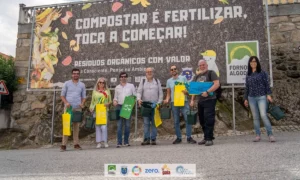Constitution of the Catalan Zero Waste strategy (Residu Zero) in Barcelona
Following the examples of Italy and the UK, last Friday the 4th of March the successful launch of the Zero Waste Catalan strategy took place in Barcelona, Catalonia, Spain!
 More than a hundred people representing local organisations, companies, universities and research centers gathered for a whole day to discuss the goals and aims and set up the forum for a Zero Waste strategy in Catalonia. Note that in Spain the waste management is a delegated competence and Catalonia –like any other Spanish autonomous region can decide on waste management-.
More than a hundred people representing local organisations, companies, universities and research centers gathered for a whole day to discuss the goals and aims and set up the forum for a Zero Waste strategy in Catalonia. Note that in Spain the waste management is a delegated competence and Catalonia –like any other Spanish autonomous region can decide on waste management-.
This initiative was possible thanks to the collaboration of all Catalan universities, the association of municipalities for door-to-door collection, municipalities already developing the model of “Residu Mínim” (minimum waste) and the local and international organisations such as GAIA, CAPS, Ecologistes de Catalunya, Cepa and other members of the steering committee.
In the conference we had the chance to learn about the best zero waste practices in the world (such as San Francisco in the US or Kovalam in India) as well as European best practices such as the first European Zero Waste town; Capannori. Rossano Ercolini from the Rete Italiana di Rifiuti Zero and head of the Zero Waste Research Center in Capannori was present to explain the success of the Italian experience.
The “Estratègia Catalana pel Residu Zero” (the Catalan Zero Waste Strategy) will organise synergies between academics, practitioners, policy-makers and civil society to channel the change of paradigm from a recycling society towards a zero waste society. In this sense, the Catalan ZW strategy wants to advance in the direction of a more efficient management of resources, more environmental justice and de-carbonisation of the economy.
The Catalan Zero Waste strategy is born in a context of insustainability in the management of municipal, construction and demolition and industrial waste.
Catalonia, despite very good scattered practices of high separate collection in some towns, still sends 70% of its waste to disposal which represents a clear inefficient use of materials, a lot of avoidable GHG emissions and a threat for the health of the citizens.
The solution is not to build new incinerators or burn municipal waste in cement kilns but rather to work on the replication of the best practices of separate collection (in some cases above 80%) in order to increase prevention and recycling.
A change of paradigm is necessary and this is exactly what the citizen driven Catalan Zero Waste strategy pursues.
- In the meeting it was discussed that Zero Waste meant:
Advancing towards a circular economy in which waste can become the raw material of the future, - Avoid the generation of any waste that can be avoided
- Ban the disposal of any waste that can be reused, recycled or composted
- The redesign and substitution of those wastes which can’t be reused, recycled or composted.
The Catalan Zero Waste strategy proposes to:
1. Invert the tendency and instead of disposing of 70% and recycling 30% reverse the trend and move towards recycling 70% and disposing of 30% for 2020. Zero Waste -less than 10kg of residual waste per capita- for 2030.
2. Set up a network of organisations, institutions, companies and universities to plan and implement this change of paradigm.
3. Promote the best local and international practices of source separation, separate collection, waste prevention, etc so that they can be replicated elsewhere in Catalonia.
4. Promote innovation in the production and legislative process in view of creating the right climate for a zero waste strategy.
5. Create a Zero Waste Research Center in which the residuals can be examined to detect failures in the design which justify a substitution for a newly designed recyclable product.
The most important thing of the event, besides the high attendance and motivation from all sectors of society, was the commitment of the participants and the concreteness on the next steps to take to make it possible to advance towards a Zero Waste future.The Catalan ZW strategy wants to advance in the direction of a more efficient management of resources, more environmental justice and de-carbonisation of the economy.


